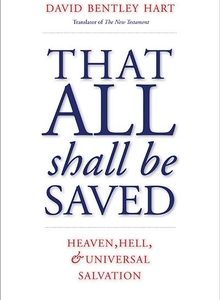To Heck with Hell
The new book by the eminent scholar David Bentley Hart is That All Shall Be Saved: Heaven, Hell, and Universal Salvation.
 In it he argues that there’s no real biblical or theological basis for a place called “hell” or for a doctrine of eternal punishment. On the other hand, there’s considerable basis for the idea of universal salvation, that all will be saved by a God who is resolved to redeem the world he has created and loves.
In it he argues that there’s no real biblical or theological basis for a place called “hell” or for a doctrine of eternal punishment. On the other hand, there’s considerable basis for the idea of universal salvation, that all will be saved by a God who is resolved to redeem the world he has created and loves.
You might think this is good news. But apparently not.
Hart has been widely reviled by many who are very committed to hell. In a recent New York Times column, he ponders people’s attachment to hell. Here’s Hart,
“For a good number of Christians, hell isn’t just a tragic shadow cast across one of an otherwise ravishing vista’s remoter corners; rather, it’s one of the landscape’s most conspicuous and delectable details.
“I know whereof I speak. I’ve published many books, often willfully provocative, and have vexed my share of critics. But only recently, in releasing a book challenging the historical validity, biblical origins, philosophical cogency and moral sanity of the standard Christian teaching on the matter of eternal damnation, have I ever inspired reactions so truculent, uninhibited and (frankly) demented.”
Hart summarizes the core of his argument as follows:
“No truly accomplished New Testament scholar, for instance, believes that later Christianity’s opulent mythology of God’s eternal torture chamber is clearly present in the scriptural texts. It’s entirely absent from St. Paul’s writings; the only eschatological fire he ever mentions brings salvation to those whom it tries (1 Corinthians 3:15). Neither is it found in the other New Testament epistles, or in any extant documents (like the Didache) from the earliest post-apostolic period. There are a few terrible, surreal, allegorical images of judgment in the Book of Revelation, but nothing that, properly read, yields a clear doctrine of eternal torment. Even the frightening language used by Jesus in the Gospels, when read in the original Greek, fails to deliver the infernal dogmas we casually assume to be there.
“On the other hand, many New Testament passages seem — and not metaphorically — to promise the eventual salvation of everyone. For example: ‘Therefore, as one trespass led to condemnation for all men, so one act of righteousness leads to justification and life for all men.’ (Romans 5:18) Or: ‘For as in Adam all die, so also in Christ shall all be made alive.’ (1 Corinthians 15:22) Or: ‘He is the propitiation for our sins, and not for ours only but also for the sins of the whole world.’ (1 John 2:2) (Or: John 13:32; Romans 11:32; 1 Timothy 2:3-6; 4:10; Titus 2:11; and others.)”
But many people, Hart has discovered, don’t just disagree with these conclusions. They are driven nuts by them. Why? Well, grace — that is unmerited forgiveness — is offensive. Don’t believe me? Just ask the older brother in the story of the Prodigal Son (Luke 15: 11 ff.) Grace is not fair. But this story, and the entire Scriptures raise the question, “Do you really want to insist that God be fair?” Think about that.
One can oversimplify all this and lose a necessary tension between judgment and grace. You then end up with what Bonhoeffer termed “cheap grace.” Grace may be free, but it is not cheap. And life is consequential. Our actions and choices matter. Reducing Christianity to cheap grace and casual forgiveness is too simple. But Hart’s argument isn’t that there is no judgment or no consequences. His argument is with the idea of eternal damnation, a place of infinite and never-ending punishment.
Back to Hart’s hunch about why his argument against hell and eternal punishment is driving so many nuts.
“How can we be winners, after all, if there are no losers? Where’s the joy in getting into the gated community and the private academy if it turns out that the gates are merely decorative and the academy has an inexhaustible scholarship program for the underprivileged? What success can there be that isn’t validated by another’s failure? What heaven can there be for us without an eternity in which to relish the impotent envy of those outside its walls?
“Not to sound too cynical. But it’s hard not to suspect that what many of us find intolerable is a concept of God that gives inadequate license to the cruelty of which our own imaginations are capable.
“An old monk on Mount Athos in Greece once told me that people rejoice in the thought of hell to the precise degree that they harbor hell within themselves. By which he meant, I believe, that heaven and hell alike are both within us all, in varying degrees, and that, for some, the idea of hell is the treasury of their most secret, most cherished hopes — the hope of being proved right when so many were wrong, of being admired when so many are despised, of being envied when so many have been scorned.”
In the end, this insistence on hell is the insistence that we, and not a gracious and liberating God, have the last word. Good news. Ours is a God who insists on getting the last word and that word is Life.
![Anthony B. Robinson [logo]](https://www.anthonybrobinson.com/wp-content/themes/anthonybrobinson/images/logo.png)
![Anthony B. Robinson [logo]](https://www.anthonybrobinson.com/wp-content/themes/anthonybrobinson/images/logo-print.png)